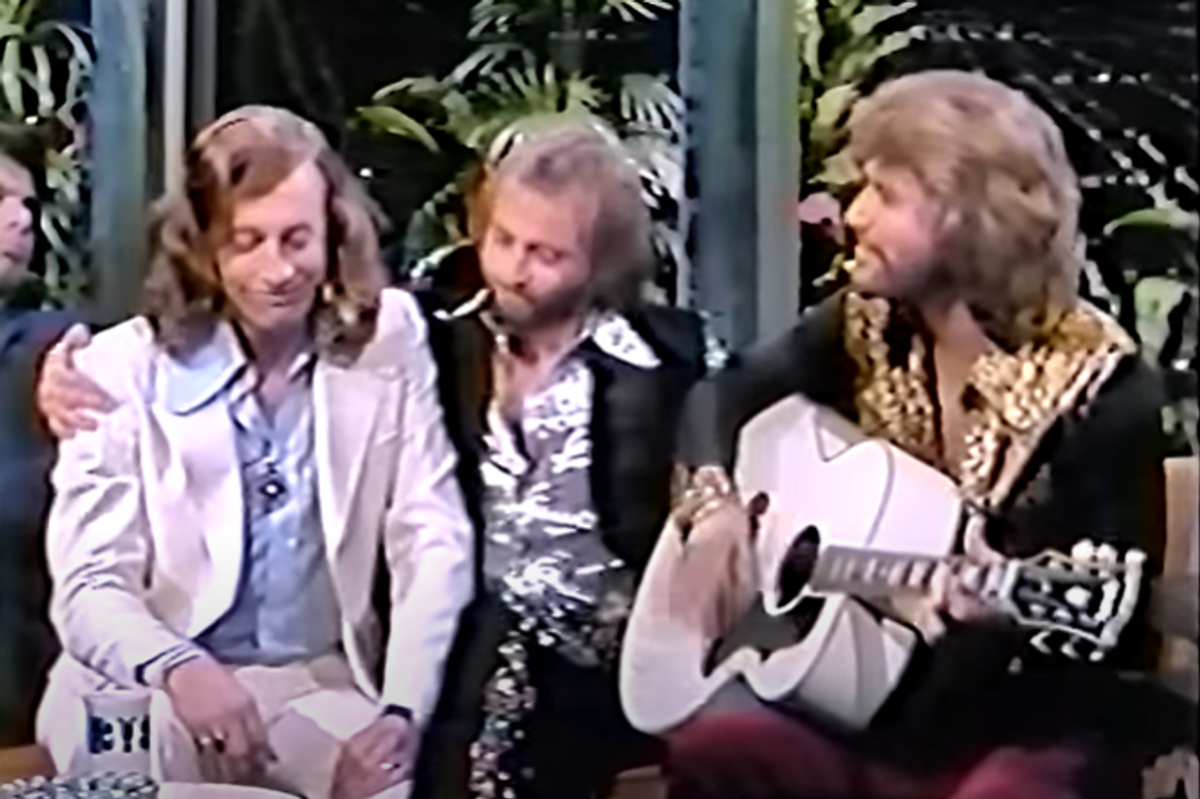The Bee Gees’ flawless harmonies left Johnny Carson speechless in this acoustic performance
When family members harmonize, there's nothing quite like it.

The Bee Gees perform on "The Tonight Show" in 1973.
The Bee Gees were one of the most popular pop groups in the world from the late ‘60s to the late ‘70s. In the early years, they had big hits such as "How Can You Mend a Broken Heart," "I Started a Joke," and “To Love Somebody.” In the late ‘70s, they found a new sound, disco music and made massive hits for the dance floor, including “Staying Alive” and “More Than a Woman."
However, between those booming Bee Gee eras, their career seemed to be on the way down. By 1973, their most recent album, “Life in a Tin Can,” and single, “Saw a New Morning,” had flopped, and they began to play smaller clubs. But that didn’t mean they couldn’t win people over with their incredible harmonies. Case in point was their March 23, 1973 performance on “The Tonight Show Starring Johnny Carson.”
Carson introduced the band by touting its history as songwriters. “My next guests have had quite a career. Their compositions have been recorded by people like Frank Sinatra, Elvis Presley, Andy Williams, Glen Campbell, Tom Jones and hundreds of others,” Carson said.
The band opened their set on stage performing “Wouldn't I Be Someone” and “Saw A New Morning” and then sat down for a chat with Carson, discussing why they don't like playing large arenas and how they got started performing together as children. After the break, they returned with an acoustic guitar and performed their first number 1 hit, "Massachusetts," from 1967, with Robin Gibb on lead with his brothers Barry and Maurice chiming in perfect harmony.
- YouTubewww.youtube.com
If you look closely in the background, Maurice is having fun goofing off when he's not on vocal duties. At the end of the performance, Carson appears to be a bit choked up as he adjusts his tie.
“Massachusetts” was written about the great migration of young people to San Franciso in 1967, as the hippie movement began to take off in the mid-to-late ‘60s. Interestingly, the Bee Gees had never been to the state.
Tried to hitch a ride to San Francisco
Gotta do the things I wanna do
And the lights all went out in Massachusetts
They brought me back to see my way with you
The song was initially written by the band for The Seekers, but they were unsuccessful in getting it to the band, so they recorded it themselves.
The Bee Gees would have a career turnaround in 1975 when they experimented with a new, more soulful sound with the song “Jive Talkin.” This became a big hit and propelled them into the world of disco, where they would become one of the era's most popular acts.
The Bee Gees' historic career ended when Maurice passed away in 2003 at age 53. Robin followed in 2009 at age 62. Barry, 78, is the final surviving member of the band.
This article originally appeared last year.
- 19 years after writing ‘Grease,’ the Bee Gees performed it for the first time and it was amazing ›
- The Bee Gees a capella version of 'How Deep is Your Love' might be even better than the original ›
- The Bee Gees 1973 'unplugged' medley of Beatles songs is blissful harmony ›
- Watch The Bee Gees sing 'How Deep Is Your Love' a capella - Upworthy ›
- 19 years after writing it, the Bee Gees finally performed 'Grease' for the first time - Upworthy ›



 Music video shot in fish-eye lens.
Music video shot in fish-eye lens.  The kids are all alright.
The kids are all alright.  Ryan Michelle Bathe's tweet about Sterling K. Brown.@ryanmichelleb/
Ryan Michelle Bathe's tweet about Sterling K. Brown.@ryanmichelleb/ Anchors aweigh!
Anchors aweigh!  Case in point, not case and point.
Case in point, not case and point.  I've been through the desert on a horse with free rein.
I've been through the desert on a horse with free rein. Buzz Off Get Away GIF
Buzz Off Get Away GIF  "Toe the line" literally means put your toe on the line.
"Toe the line" literally means put your toe on the line. Be Yourself Tonight Show GIF by The Tonight Show Starring Jimmy Fallon
Be Yourself Tonight Show GIF by The Tonight Show Starring Jimmy Fallon